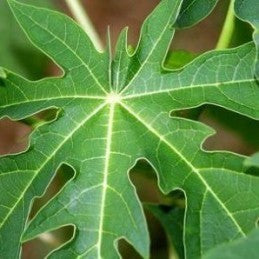Papaya - Fruta Bomba Herb
Papaya - Fruta Bomba Herb
Papaya - Fruta Bomba Herb
Papaya, also known as Fruta Bomba in Spanish, is a tropical fruit that is widely cultivated for its delicious taste and numerous health benefits. However, the papaya fruit is not the only part of the plant that is valuable. The leaves, seeds, and even the sap of the papaya tree have been used for centuries for their medicinal properties.
Properties and Benefits
The papaya tree contains an enzyme called papain, which is commonly used in digestive aids and is known for its anti-inflammatory properties. The leaves of the papaya tree are also rich in antioxidants and are believed to have immune-boosting properties.
In traditional medicine, the papaya tree has been used to treat a wide range of ailments, including digestive issues, inflammation, and infections. The seeds of the papaya fruit are also believed to have antibacterial and antifungal properties.
Papaya is also rich in vitamins A and C, which are important for maintaining healthy skin and a strong immune system. It also contains potassium, which helps regulate blood pressure and supports heart health.
Uses Fruta Bomba Herb
Papaya is a versatile fruit that can be eaten fresh or used in a variety of dishes, such as salads, smoothies, and desserts. The leaves of the papaya tree can be consumed in tea form or used topically as a natural remedy for skin conditions such as acne and eczema.
In addition to its culinary and medicinal uses, papaya is also believed to have spiritual properties. In some cultures, the papaya tree is considered to be a symbol of fertility and is used in fertility rituals. The fruit is also associated with abundance and prosperity, and is sometimes used in abundance spells and rituals.
Conclusion
Papaya, or Fruta Bomba, is a tropical fruit with numerous health benefits and medicinal properties. Its leaves, seeds, and sap have been used in traditional medicine for centuries. In addition to its health benefits, papaya is also associated with spiritual properties, making it a valuable herb in both the culinary and spiritual worlds.
Share


